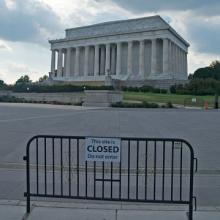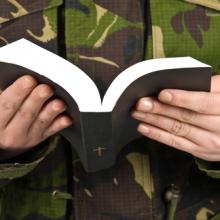military chaplains
PUTIN'S CARNAGE IN Ukraine has given us a horrendous window into the immorality of modern warfare. We may feel one side is an innocent victim and the other an egregious aggressor, but the images from bombed-out civilian sites give us daily, gruesome reminders that the waging of war today is anything but “just,” typified by indiscriminate killing, high civilian casualties, and military actions that are in no way last resorts—and behind all this brutality, the very real threat from even-more-devastating nuclear “weapons of mass destruction.” War is hell, and it always has been, but modern weaponry, tactics, and attitudes make it perhaps more hellacious than ever, especially for civilians.
In this context, who can serve as the outside moral voice, raising questions around the ethics of modern warfare? Who can bring to bear the church’s teaching on war and hold the warriors, particularly those who profess faith, to account? Who can challenge the moral framework of a war and how it is waged? The answer to those questions is probably not “military chaplains.” Tom Witt, a longtime activist and former head of the Lutheran Peace Fellowship, is concerned about the fact that military chaplains are in the military chain of command. “When chaplains are hired by, under the command of, and getting paid by the military,” Witt told Sojourners, “there’s not much chance they can be anything other than cheerleaders, or people who affirm whatever kind of war that we’re in, even if it’s not a so-called ‘just war.’” What we have, Witt said, “is a military chaplaincy rather than a chaplaincy to the military”—and such “embedded” chaplains aren’t free to oppose military doctrines or actions, even if they contradict the teachings of the church.
As the government shutdown enters its second week, some religious groups are starting to feel the pinch, and they’re also finding ways to reach out.
More than 90 Catholic, evangelical, and Protestant leaders have signed a statement rebuking “pro-life” lawmakers for the shutdown, saying they are “appalled that elected officials are pursuing an extreme ideological agenda at the expense of the working poor and vulnerable families” who won’t receive government benefits.
Starting Wednesday, evangelical, Catholic, and mainline Protestant leaders will hold a daily “Faithful Filibuster” on Capitol Hill with Bible verses on the poor “to remind Congress that its dysfunction hurts struggling families and low-income people.”
Catholic military chaplains cannot be forced to witness or bless a same-sex marriage, nor are they allowed to take part in any marriage counseling retreats that are open to gay couples under new rules issued by the Archdiocese for the Military Services.
The rules, sent to chaplains on Sept. 18 by Archbishop Timothy P. Broglio, head of the AMS, also bar chaplains from taking part in a funeral for a Catholic if that participation “would give the impression that the church approves of same sex ‘marital’ relationships.”
But the new rules also set out conditions that would allow Catholic military commanders to comply, without violating their beliefs, with rules giving same-sex couples under their command federal employee benefits as required by law.
House lawmakers late Tuesday approved an amendment to a Pentagon spending bill to prevent the appointment of nonreligious military chaplains.
The amendment, sponsored by Rep. John C. Fleming, R-La., requires that only religious organizations be permitted to endorse chaplains for the military.
“The amendment holds the military to its current standards on endorsing agencies, which must be recognized religious and faith-based organizations,” said Fleming’s spokesman, Doug Sachtleben.
Christian conservatives have grown increasingly alarmed in recent weeks over reports and rumors that the Pentagon is considering new policies aimed at discriminating against Christians and disciplining or even court-martialing those who share their faith.
But the Department of Defense on Thursday sought to debunk that speculation, saying that while aggressive proselytizing is barred, evangelization is still permitted and the rights of all believers – and non-believers – will be protected.
“The U.S. Department of Defense has never and will never single out a particular religious group for persecution or prosecution,” Pentagon spokesman Lt. Cmdr. Nate Christensen said in a statement. “The Department makes reasonable accommodations for all religions and celebrates the religious diversity of our service members.”
Growing up in Kuwait, Asif Balbale thought he wanted to become a chemical engineer. He never imagined enlisting in the U.S. Navy, much less becoming an imam.
Balbale got his engineering degree after immigrating to the U.S. at age 21. With jobs hard to come by, he tried to enlist in the Army, but didn't weigh enough. Instead, he met the Navy's minimum requirements.
He was sworn in as a U.S. citizen in 2005 while deployed aboard the USS Boxer. Intending to apply for an officer program, Balbale, 31, mistakenly emailed a recruiter for the chaplain corps.
"God, I think, had better plans for me," Balbale said, looking back.
And so it is for a number of military chaplains who, by twists of fate or perhaps divine Providence, found their calling to become chaplains while on active duty.





